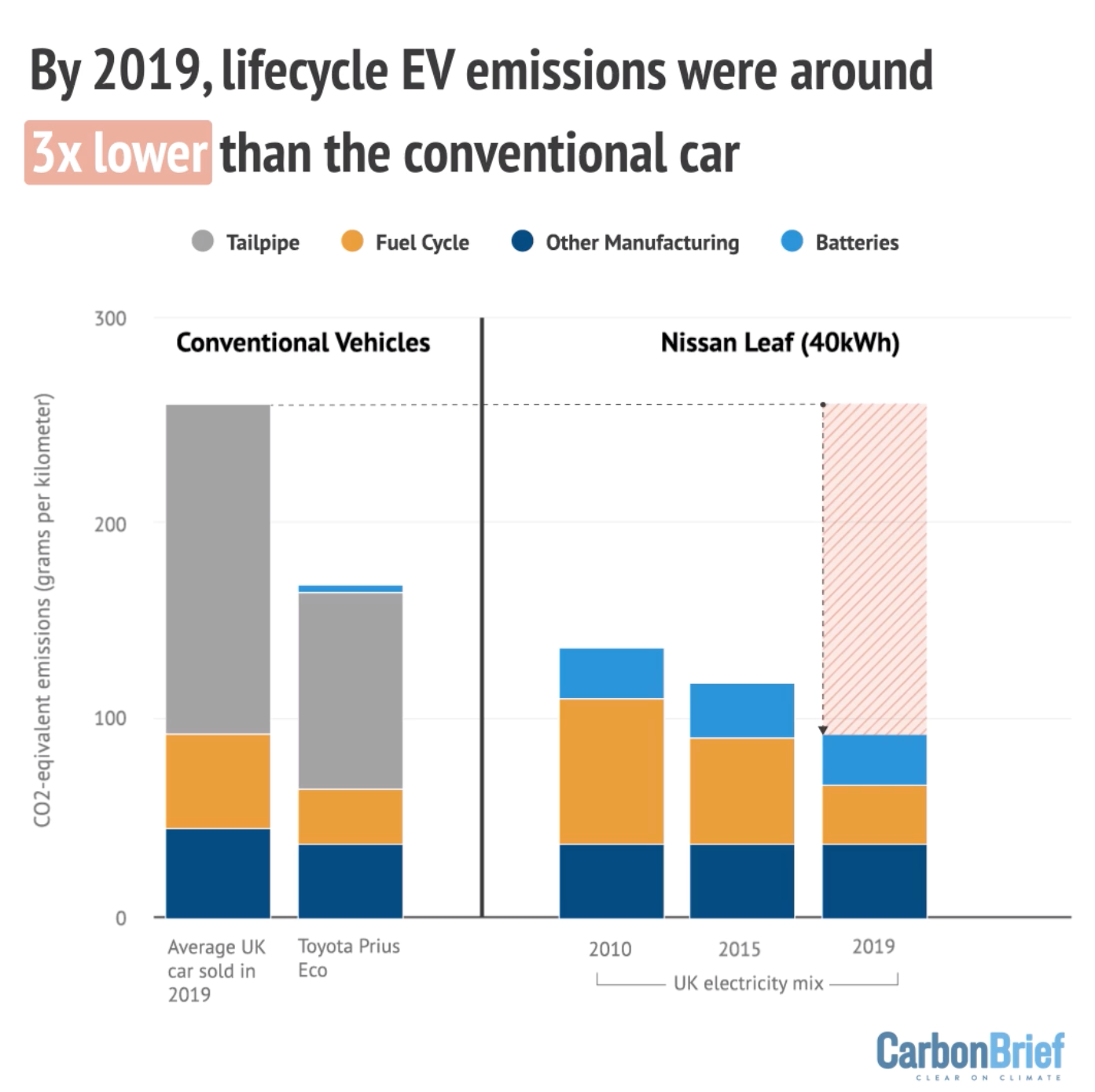Now the carbon intensity of charging a Tesla has nearly halved to 74gkm in winter and 41 gkm in summer as the UK continues to break its own renewable energy records. In the winter of 2012 producing the electricity for a full charge created 124g of carbon emissions per km driven roughly the same as a 2L Range Rover Evoque.
Https Www Transportenvironment Org Sites Te Files Downloads T 26e E2 80 99s 20ev 20life 20cycle 20analysis 20lca Pdf
But the carbon footprint of an electric car doesnt just start when the proud new owner presses the start button for the first time.

Do electric cars have a lower carbon footprint. Electric vehicles are nearly always lower-carbon than petrol or diesel cars especially in a country that produces much of its electricity by renewables or nuclear. The researchers say average lifetime emissions from electric cars are up to 70 lower than petrol cars in countries like Sweden and France where most electricity comes from renewables. For smaller EVs the results are even better.
For larger longer-range EVs that travel more than 250 miles per charge the manufacturing emissions can be as much as 68. That is using average grid electricity EVs come out about 18 better in terms of their carbon footprint. The Nissan Leaf and BMW i3 can.
Where you buy and drive your electric car can have an effect on their carbon emissions. Over time it can catch up on the combustion engine car. Tesla recycles it recovering 70 of the carbon.
Electric cars have several benefits over conventional internal combust engine automobiles reduction of local air pollution especially in cities as they do not emit harmful tailpipe pollutants such as particulates soot volatile organic compounds hydrocarbons carbon monoxide ozone lead and various oxides of nitrogen. Some electric vehicles are initially responsible for more emissions than internal combustion engine vehicles because of manufacturing impacts. Governments can help by speeding up their transition to greener energy.
Likewise electric cars in New Zealand work out a lot better than fossil-fuelled. A key reason is that the train or the diesel bus may be a big carbon emitter but its designed to carry a lot of passengers so the per capita emissions are a lot lower. One study found that emissions from EVs have emissions up to 43 lower than diesel vehicles.
At least one thing is certain. When the car is braking and idling it is self-sustaining itself. Thirdly while an electric vehicle has a higher carbon footprint at the beginning of its lifecycle it is typically cleaner once in use.
Scientific studies have shown that manufacturing an electric vehicle generates more carbon emissions than building a traditional car. But they make up for it after three years. If an electric car is charged with green electricity it does not produce any climate-damaging carbon dioxide emissions during operation.
Electric cars DO have a smaller carbon footprint - even when making batteries and generating electricity is taken into account says VW Volkswagen compared the life cycle of an electric. However EVs typically produce fewer life cycle emissions than conventional vehicles because most emissions are lower for electricity generation than burning gasoline or diesel. Why is the carbon footprint per kilometer higher for domestic flight than long-haul flights.
That is using average grid electricity EVs come out about 18 per cent better in terms of their carbon footprint. Another detailed that in all cases examined electric cars have lower lifetime climate impacts than those with internal combustion engines. Do electric cars have a bigger carbon footprint.
A coal-powered battery is dirtier than a solar-powered battery. The exact amount of these emissions depends on your electricity mix which varies by geographic location. An electric car doesnt produce emissions but its parts still have a carbon footprint.
This app rates cars based on their mileage fuel type and emissions from both the production of the car and if they are EVs from generating the electricity to run them. Umicores factory plants are able to recycle our batteries into completely reusable materials and substantially reduce the carbon footprint. Making electric cars uses a lot of energy.
Because about 20 per cent of our electricity is generated from burning natural gas and coal this will also add to an electric cars lifetime carbon footprint about 43 tonnes for a distance of. Likewise electric cars in New Zealand work out a. If you are in a heavy coal-production state such as West Virginia then fuel-efficient gas-powered vehicles are still the best option for lowered emissions.
